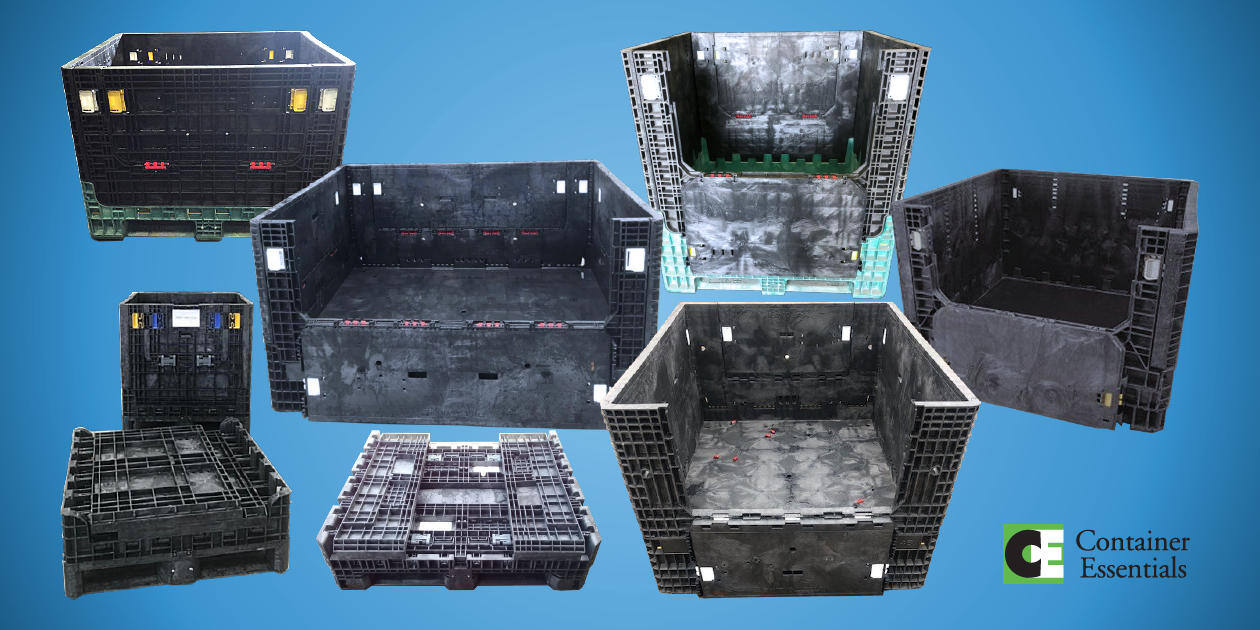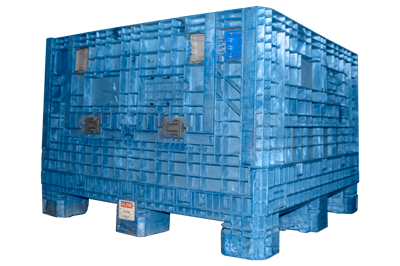Explore efficient storage ideas using refurbished bulk containers in retail
Why Mass Containers Are Essential for Lasting and Cost-efficient Transport
Bulk containers play a crucial function in modern logistics. They promote the effective activity of large amounts of products, thus enhancing transportation processes. This method not only reduces expenses however likewise minimizes ecological impact via lower discharges and waste generation. As sectors seek more sustainable techniques, the fostering of bulk containers is ending up being significantly significant. What ramifications does this change hold for future logistics and supply chain administration?

The Advantages of Using Bulk Containers in Logistics
Mass containers change logistics by improving effectiveness and sustainability. These containers allow for the transportation of large quantities of products in a solitary journey, considerably reducing the variety of journeys required. This not only streamlines procedures but also reduces labor prices associated with handling, loading, and dumping. Additionally, bulk containers are designed to enhance room utilization within transport lorries, guaranteeing that more products can be delivered simultaneously.
The standardization of mass containers likewise simplifies the logistics process. With consistent measurements, they can be quickly stacked and stored, resulting in boosted storage facility management. Bulk containers usually include resilient products that safeguard materials from damage throughout transportation, therefore reducing product loss and boosting total dependability. Consequently, businesses can experience improved supply chain efficiency, inevitably leading to boosted earnings and client satisfaction. This mix of factors makes bulk containers a crucial asset in modern logistics.
Environmental Effect: Decreasing Waste and Carbon Impact
As industries increasingly prioritize sustainability, the adoption of mass containers has actually become a vital strategy for lowering waste and reducing carbon impacts. These containers minimize making use of product packaging products, such as boxes and plastic, therefore significantly reducing total waste generation. By combining shipments, mass containers boost transport effectiveness, permitting for even more items to be transported per journey. This decrease in trips straight associates with reduced greenhouse gas emissions, adding to a smaller sized carbon impact.
Furthermore, bulk containers can usually be reused or recycled, additionally mitigating ecological effect. The resilience of these containers guarantees they can withstand multiple transportation cycles, reducing the demand for single-use alternatives. used bulk containers. By improving logistics and advertising reliable resource usage, mass containers not just support lasting methods yet also motivate industries to line up with worldwide environmental objectives. Eventually, their implementation reflects a dedication to environmental stewardship and accountable resource monitoring
Price Financial Savings: Just How Bulk Containers Lower Transportation Expenditures
While several firms look for ways to boost their bottom line, using bulk containers presents a substantial possibility for lowering transportation expenses. Mass containers make the most of the volume of items delivered, enabling organizations to deliver larger quantities simultaneously. This performance reduces the number of trips called for, directly reducing fuel expenses and decreasing labor expenditures related to loading and unloading.
Furthermore, bulk containers often feature streamlined layouts that optimize area use within transportation automobiles. This suggests fewer voids, bring about much more effective use readily available capacity. The longevity of mass containers can reduce the danger of item damage during transit, decreasing losses and making certain that even more products show up undamaged.
Enhancing Supply Chain Effectiveness With Bulk Storage Solutions
Bulk storage options play a necessary function in enhancing supply chain performance by optimizing inventory administration. By settling goods into fewer, larger containers, services can significantly reduce managing costs connected with regular transfers and processing. This structured technique allows for better tracking and monitoring of stock, ultimately resulting in enhanced functional efficiency.
Streamlined Inventory Management
Effective stock monitoring is vital for enhancing supply chain operations, especially when companies embrace bulk storage space remedies. These remedies enable organizations to preserve greater supply degrees while lessening the frequency of replenishment. By settling products right into bulk containers, firms can enhance their stock procedures, reducing the complexity connected with tracking several smaller plans. This strategy facilitates precise supply matters and improves forecasting accuracy, enabling more informed decision-making. In enhancement, mass storage options streamline stockroom company, making it less complicated to find and access items when required. Therefore, organizations can attain a more effective inventory turnover price, inevitably enhancing total supply chain performance and lowering the possibility of stockouts or overstock scenarios.

Decreased Handling Costs
The application of mass storage space options not only enhances supply monitoring but also considerably lowers managing costs throughout the supply chain. By settling materials right into mass containers, firms reduce the requirement for frequent handling and transfer between various storage and transport devices. This technique reduces down on labor prices related to loading, dumping, and relocating smaller sized packages. Additionally, mass storage reduces the frequency of shipments, causing reduced transportation prices and decreased fuel intake. Consequently, organizations can optimize their logistics operations, permitting a much more reliable allowance of resources. Inevitably, decreased taking care of costs contribute to enhanced overall supply chain performance, promoting an atmosphere that sustains both sustainability and economic viability.

Adaptability of Bulk Containers Throughout Different Industries
Although lots of industries have unique requirements for transport and storage, bulk containers have emerged as a flexible solution that meets a vast array of requirements. These containers, ranging from large bins to specialized storage tanks, can accommodate diverse materials, consisting of powders, fluids, and granules. In the agricultural field, bulk containers facilitate the transport of grains and plant foods, while the food and drink market uses them for active ingredients and finished products. The chemical market counts on bulk containers for safely delivering unsafe materials, making sure conformity with safety guidelines. Additionally, construction firms benefit from bulk containers for moving accumulations and various other products. Their versatility encompasses different modes of transportation, consisting of trucks, trains, and ships, boosting logistical effectiveness. This flexibility not only enhances operations throughout article various markets however also promotes sustainability by lowering product packaging waste and enhancing room en route. For that reason, bulk containers play an important role in modern-day supply chain monitoring.
Future Trends in Bulk Container Usage and Sustainability
The future of mass container usage is progressively shaped by innovative materials development that boosts sustainability. Furthermore, automation in logistics promises to enhance operations, lowering waste and enhancing performance. Accepting circular economic situation methods will certainly even more revolutionize exactly how bulk containers are developed, made use of, and reused, promoting an extra lasting transportation landscape.
Ingenious Products Advancement
As markets significantly prioritize sustainability, cutting-edge products advancement in bulk containers becomes a significant variable in enhancing eco-friendly transportation remedies. Researchers and suppliers are discovering naturally degradable plastics, recycled compounds, and lightweight metals to minimize ecological impact. These products not just reduce waste however additionally improve fuel effectiveness by lowering the overall weight of containers. Furthermore, advancements in smart materials, which can adjust to differing problems, boost the resilience and performance of mass containers. The combination of these cutting-edge products straightens with round economic climate principles, advertising reuse and recycling. As the need for lasting techniques expands, the growth of such products will certainly play a vital role in shaping the future of bulk container usage in logistics and transportation.
Automation in Logistics
Considerable innovations in automation are positioned to change logistics and the utilization of bulk containers, enhancing sustainability in transport. Automated systems, consisting of drones and independent vehicles, are streamlining the movement of mass containers, lowering the dependence on typical fuel-powered transportation. These modern technologies maximize transmitting and packing processes, reducing empty miles and boosting fuel effectiveness. Furthermore, automated supply monitoring systems enhance tracking and tracking of bulk containers, guaranteeing much better source allotment and minimized waste. The assimilation of the Net of Points (IoT) enables real-time data analysis, enabling proactive decision-making that lines up with sustainability goals. As automation remains to develop, it is anticipated to drive better technologies wholesale container usage, eventually supporting more sustainable logistics techniques and minimizing the ecological effect of transport.
Round Economic Situation Practices
Advancements in automation are establishing the phase for a more incorporated approach to circular economic situation techniques in the domain of bulk container use. As sectors progressively accept sustainability, bulk containers are being designed for long life and reusability. This change not only lessens waste but additionally enhances source performance. Companies are embracing strategies such as closed-loop systems, where made use of containers are collected, refurbished, and reestablished into the supply chain. Furthermore, clever innovations track container life process, helping with much better administration and reducing environmental effect. The cooperation between producers, logistics companies, and end-users is important in developing criteria for lasting container use. used collapsible containers. Future fads indicate a growing emphasis on materials that are recyclable and naturally degradable, more enhancing the round economy's concepts in mass transportation

Frequently Asked Inquiries
What Materials Are Bulk Containers Typically Made From?
Bulk containers are commonly built from resilient products such as high-density polyethylene, steel, aluminum, and cardboard. These products supply adaptability, toughness, and defense, making them ideal for delivering various goods in different markets effectively.
Just how Do I Pick the Right Dimension Mass Container?
Picking the right size mass container entails assessing the volume of products to be delivered, considering taking care of devices compatibility, and assessing storage space needs. Appropriate size assurances efficiency in transportation and lessens waste throughout shipment.
Are Bulk Containers Reusable or Recyclable?
Mass containers are frequently reusable, developed for multiple trips, improving sustainability. Numerous can additionally be recycled, depending on the materials made use of. Selecting recyclable alternatives better reduces and sustains ecological goals waste in you could check here transportation techniques.
What Safety And Security Rules Put On Mass Container Transportation?
Safety laws for bulk container transport consist of compliance with the Department of Transport standards, appropriate labeling of hazardous products, view structural stability assessments, and adherence to weight restrictions to assure safe handling and stop mishaps throughout transportation.
Just How Can Services Shift to Using Mass Containers Properly?
Businesses can transform to bulk containers by examining current logistics, educating team on handling, buying ideal devices, optimizing stock management, and working together with suppliers to ensure compatibility and performance throughout the supply chain.
As markets significantly prioritize sustainability, the fostering of bulk containers has actually emerged as an essential approach for decreasing waste and decreasing carbon footprints. By combining products into bulk containers, firms can enhance their supply procedures, reducing the complexity linked with tracking numerous smaller bundles. As industries progressively prioritize sustainability, ingenious products advancement in mass containers emerges as a substantial element in boosting environment-friendly transport options. Automated systems, consisting of drones and autonomous cars, are enhancing the activity of mass containers, reducing the reliance on conventional fuel-powered transportation. In addition, automated inventory management systems improve monitoring and tracking of mass containers, ensuring better source allowance and decreased waste.